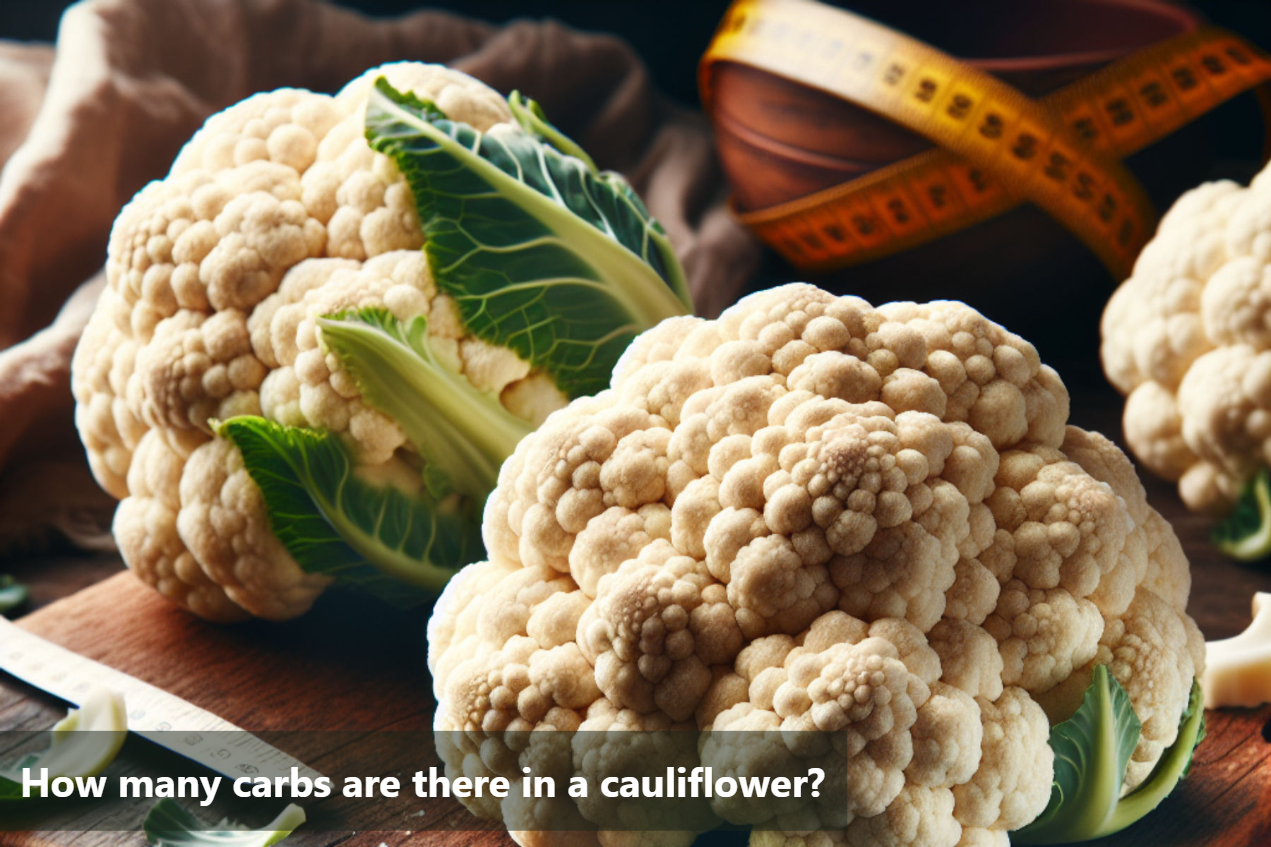
How many carbs are there in a cauliflower?
Cauliflower, often referred to as a versatile vegetable, belongs to the cruciferous family and is known for its impressive nutritional profile. Packed with essential vitamins, minerals, and antioxidants, cauliflower has gained popularity among health enthusiasts and foodies alike. But one aspect that often intrigues individuals is the carb content present in this cruciferous gem.
It's crucial to understand the role that carbohydrates play in its overall composition. While cauliflower is low in carbs compared to other vegetables, it still contains a moderate amount that can impact your dietary choices. By exploring the carb content of cauliflower, we can make informed decisions about our food intake and meal planning.

Nutritional Profile of Cauliflower
One cup of raw chopped cauliflower (107g) contains:
Calories |
27 |
Fat |
0.3g |
Sodium |
32.1mg |
Carbohydrates |
5.3g |
Fibre |
2.1g |
Sugars |
2g |
Protein |
2.1g |
Vitamin C |
51.6mg |
Vitamin B6 |
0.2mg |
Magnesium |
16mg |
Potassium |
319.9mg |
Folate |
61mcg |
Choline |
47.4mg |
Vitamin K |
16.6mcg |
Quick and Easy Roasted Cauliflower
Ingredients |
Instructions |
|---|---|
|
|
Cauliflower Delights
Steamed Cauliflower: This cooking method is straightforward—steam the whole cauliflower head or cut it into florets for a simple and healthy preparation.
Roasted Cauliflower: Transform cauliflower into a flavourful dish by cutting it into steaks or florets, placing them on a baking sheet, drizzling with olive oil, and roasting until they achieve a golden, caramelised perfection.
Pureed Cauliflower: Create a smooth puree by blending cooked cauliflower. This versatile puree can be used as a substitute for cream sauces or added to smoothies for a nutritious boost.
Mashed Cauliflower: Elevate mashed potatoes by incorporating steamed cauliflower, enhancing both flavour and nutritional content. Alternatively, opt for low-carb mashed cauliflower, either as a standalone side or mixed into pizza dough for a lighter crust.
When to avoid Cauliflower?
Individuals with specific health conditions may need to consult their doctor before incorporating cauliflower into their diet. These conditions include:
Thyroid Disorders: Individuals with thyroid issues should exercise caution with cauliflower consumption. The vegetable contains compounds that could potentially interfere with iodine absorption by the thyroid, hindering hormone production. However, it's important to note that consuming an excessive amount of cauliflower in one sitting would be necessary for this impact to occur.
Digestive or Gastrointestinal (GI) Issues: Cruciferous vegetables, including cauliflower, may lead to bloating and gas, particularly for those with digestive conditions such as irritable bowel syndrome (IBS), inflammatory bowel disease (IBD), Crohn's disease, or ulcerative colitis. Individuals with such conditions should be mindful of their cauliflower intake and consult with their doctor if concerns arise.

Counting Carbs in Cauliflower: A Quick and Easy Reference
Understanding the carb content in cauliflower is crucial for making informed choices about our food intake and maintaining a balanced diet. We have emphasised the importance of being aware of how many carbs are present in cauliflower. By knowing the carb content, individuals can better manage their carbohydrate consumption and tailor their eating habits to align with their health goals.
It is imperative to highlight that cauliflower is a versatile and nutritious vegetable that can be a valuable addition to a low-carb diet. Its low carb content makes it an excellent option for those looking to reduce their carb intake while still enjoying a variety of flavourful dishes.
Being mindful of the carbs in cauliflower empowers us to make informed decisions about our nutrition, promoting overall health and well-being. By incorporating cauliflower into our meals thoughtfully, we can savor its nutritional benefits while supporting our dietary objectives.
FAQs
-
Is cauliflower a low-carb vegetable?
Yes, cauliflower is considered a low-carb vegetable due to its low carbohydrate content.
-
Can cauliflower be included in a keto diet?
Absolutely! Cauliflower is commonly used in keto recipes due to its low carb content.
-
Does cooking cauliflower affect its carb count?
Cooking methods such as boiling, steaming, or roasting do not significantly alter the carb content of cauliflower.
-
Are there more carbs in cauliflower when it's cooked compared to raw?
Cooking cauliflower may slightly reduce its carb content but not significantly enough to impact its carb count.
-
Can cauliflower substitute high-carb ingredients in recipes?
Cauliflower is a versatile low-carb substitute in various recipes, such as cauliflower rice, crusts, and mashed cauliflower.
-
What is the fibre content in cauliflower and how does it impact the net carbs?
Cauliflower is a good source of fibre, which can help reduce the net carb count by aiding digestion and slowing down sugar absorption.
This Blog post is an initiative by Lo! Foods, to provide accurate and Nutritionist / Doctor approved information related to Health. Lo! Foods is India's leading brand for Everyday Functional Foods. Foods designed for specific Health conditions or Needs. Lo! Foods also runs India's largest range of Low Carb Healthy Cloud Kitchens, under the brand names of Lo!, ProteinChef, ATH (All Things Healthy) and DiabeSmart.















Leave a comment
Your email address will not be published.